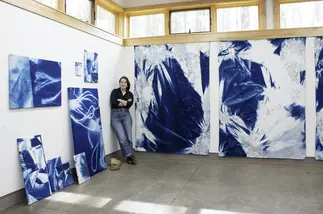Building Quantitative Literacy Through Science, Education, and Art
Virtual Workshop at the American Geophysical Union Meeting
Wednesday, 8 December 2021: 08:00 a.m. - 14:00 p.m. CST
Project EDDIE (Environmental Data-Driven Inquiry and Exploration) is a community of STEM instructors and educational researchers that has built teaching modules with open datasets spanning topics such as ecology, limnology, geology, hydrology, environmental sciences, and macrosystems ecology. Modules support student quantitative literacy through scaffolding quantitative reasoning skills and building student expertise with the nuances of earth and environmental analyses.
In this workshop educators will engage with strategies from Project EDDIE modules for teaching inquiry and quantitative reasoning. In the second half of this workshop, artists will share rich examples of how they have built connections or translated science into moving and transformative contexts. Using what they have learned from EDDIE materials and artists, participants will develop and share their ideas for deepening student and community connection through inquiry, quantitative reasoning, and art. This should be an exciting place to explore ideas for making science more connective for students, supporting them both in science and advocacy.
Register for AGU and sign up for the Virtual EDDIE Workshop here. You will have the opportunity to add Events and Scientific Workshops to your cart before completing your registration. Once you select registration type, chose this workshop from the events page.
Workshop Facilitators
- Susan Eriksson, Geoscience Educator and Evaluator, Independent Artist
- Sarah Fortner, SERC at Carleton College
- Thomas Meixner, Hydrology and Atmospheric Sciences, The University of Arizona
- Hannah Perrine Mode, Independent Artist, Academic Council Juneau Icefield Research Program
Artist Panel
- Gabriel Harp (Art & Science in Higher Education)
- Jiabao Li (Artist, Designer & Technologist)
- Francesca Samsel (Artist, Big data visualization)
- Hannah Perrine Mode (Artist, Faculty on the Juneau Icefield Research Program)
Please sign up for the Project EDDIE interest list if you want to stay in the loop on this or other opportunities to engage.)
Contact Sarah Fortner (sfortner at Carleton College) or Monica Bruckner (mbruckne at Carleton College) with questions about the workshop.

![[creative commons]](/images/creativecommons_16.png)
